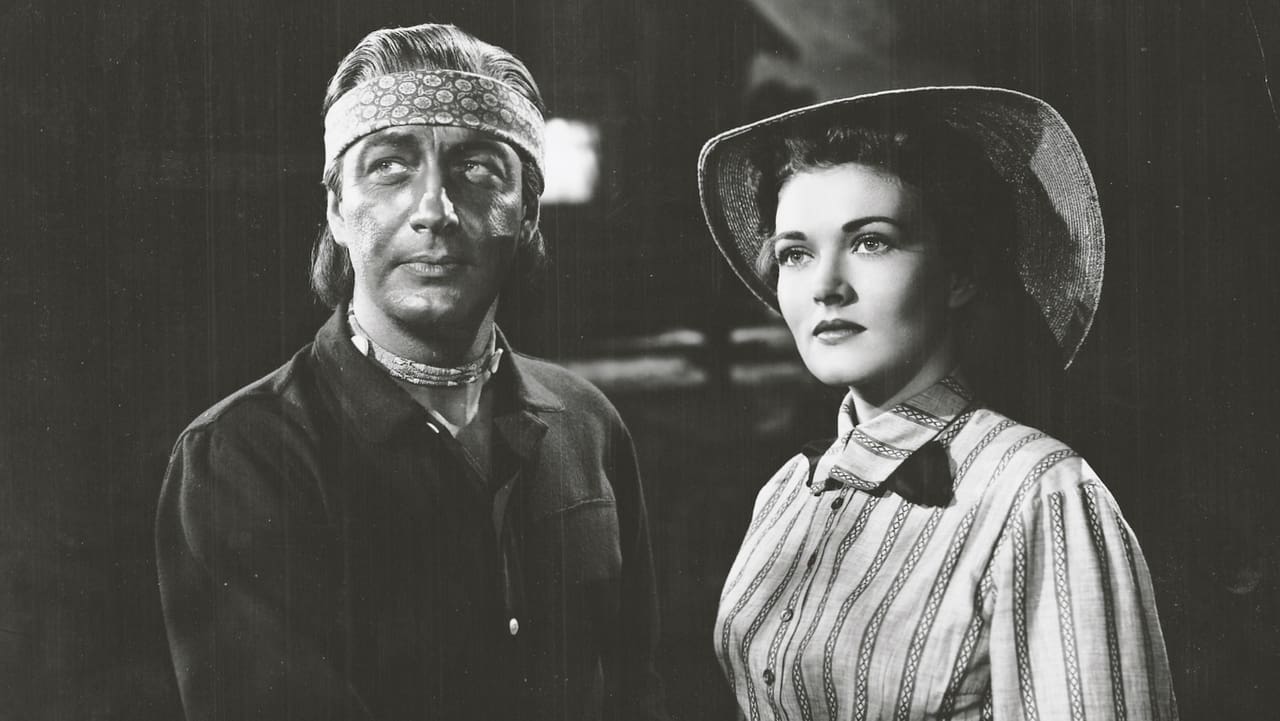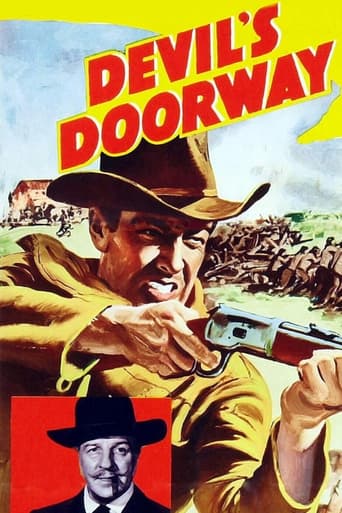

Robert Taylor plays an unconvincing Indian in this film as he sounds the same and wears dark make-up and dresses in traditional Indian costume. He has strength of character in confrontations which is why he is interesting watching, although I think the scriptwriter is on his side writing situations that are in his favour.Louis Calhern is interesting as an antagonist, but he's all talk and no substance. He talks at Taylor rather than to him.It's interesting seeing Taylor subjected to prejudices against Indians, especially as he has his own prejudice against women at the beginning. The prejudice against Indians could be used in any context in any time period which has crossover appeal.
... View MoreWhile some might balk at the idea of Robert Taylor playing an American Indian, such casting was pretty typical of this era--with folks like Rock Hudson and Paul Newman cast as Indians as well! Plus, while the casting is poor, the film does have a lot in its favor. The biggest plus is that the American Indian is portrayed VERY sympathetically here and is a film about intolerance and prejudice--and makes some excellent points to counter the prevailing "evil and stupid Indian" image many films of the day. Plus, although Taylor is an Anglo with an aquiline nose and blue eyes, the film manages to have him appear rather Indian-like--and his craggy middle-aged good looks helped--along with gobs of skin paint! I cannot speak for American Indians, but I assume most would appreciate the film's message and overlook the casting--as there simply wasn't any better sort of film about them made at the time--and very, very few since.The film begins with Taylor returning home after several years absence serving in the Union army during the Civil War. Along the way, he developed a bit of naiveté and assumes his being a sergeant in the military and living out the White American dream that he'd be accorded respect and equal treatment at home. However, there's an ill-will brewing and instead of receiving honor for his service (which had earned him the Medal of Honor--the nation's highest military award), he will face a lot of unreasoning hate. At the heart of this is a scum-bag lawyer (imagine that!) who is bent on stirring up the Whites against the Indians--mostly so he man make himself rich in the process.I could say more to the plot, as there is quite a bit more to the film, but I really don't want to spoil the film. Suffice to say that it is very well written--mostly because it is NOT a movie with a clear message that the settlers were all evil and the Shoshone were perfect and noble. I liked this, as both sides had a point--though the Natives clearly were having their rights cast aside in the process. The characters, as a result, were multidimensional and interesting.Overall, if you are a bit tired of cookie-cutter westerns and are looking for something a bit different, "Devil's Doorway" is a pretty good bet.
... View MoreThis movie is a hidden gem. Directed by Anthony Mann, it was probably the first "Civil Rights" Western that went "all in" in terms of presenting the Indian point of view. At the same time, Mann's intensity and fundamental dark view of mankind keep it from becoming condescending or maudlin. Pretty impressive to take this theme on so aggressively a full four years before the "Brown vs. Board of Education" Supreme Court decision kicked off the modern Civil Rights movement.Here are some of the pluses:This is an absolutely terrific performance by Robert Taylor, all the more impressive since it's hard to imagine him playing a full blooded Shoshone Indian. He pulls it off in spades. I haven't seen every Robert Taylor movie, but I can't believe he ever had a better part. Even more impressive, this is an ultra-liberal movie and in real life Taylor was a well known right wing kook. Now that's acting!!This is in black and white, but the movie has a fantastic look and feel to it. Mann's superior direction and creative camera angles jump out at you.One of my favorite Western themes, the Civil War tie-in, is prominent. Lance Poole is a decorated Union Army veteran who returns home to confront racism. In 1950, this is clearly a metaphor for the plight black WW2 veterans returning to the Jim Crow South.It is well plotted. Everything makes sense, is plausible and all the character's motivations are consistent and logical (not something you find in all Anthony Mann Westerns. See my review of "The Man From Laramie").In most cases, the love interest in Westerns is blatantly gratuitous. Orrie Masters, nicely played by Paula Raymond, is written solidly into the script as a sympathetic lawyer. Of course, the movie is once again way ahead of its time with its portrayal of a professional woman.An excellent portrayal of the Shoshones and their plight.Absolutely fantastic Montana location shoot. A shame it wasn't in color.The negatives in this movie are very minor:The problem with going "all in" Indian point of view is that it is inherently depressing.Could have used a stronger supporting cast. Louis Calhern is good as the heavy, but this part could have been stronger.No room for comic relief in the dark world of Anthony Mann. All that stops this from devolving into a lugubrious depress-fest is the edgy plot, good action scenes and Taylor's compelling performance.
... View MoreAnthony Mann's first western maybe one of the best ever done and sad to say it was probably overshadowed by the more popular Broken Arrow which also dealt sympathetically with the plight of the American Indian. Right after Devil's Doorway Mann did Winchester 73 and a whole slew of films with James Stewart, mostly westerns and well received ones at that. Devil's Doorway should be grouped with those films as well as a cinema classic. My guess is that it is because Mann never did another film with Robert Taylor. If anyone knows why, please let me know.Robert Taylor gives one of his best screen performances as Lance Poole, Union Army veteran and Congressional Medal of Honor winner and full blooded Shoshoni Indian. He's returned to his ranch in Wyoming hoping to pick up the pieces of his civilian life. Taylor has bought into the ideals of the Civil War. He in fact went to war to free another group of people from slavery.It's one big disillusioning process as he discovers that Indians need not apply for a piece of the American dream. The Homestead Act which Abraham Lincoln signed during the Civil War specifically excludes Indians from its provisions.Louis Calhern portrays one of the most loathsome villains of his career as Verne Coolan, a lawyer who apparently for no other reason than his own hatred of the red man, stirs up hatred and resentment against Taylor and the Shoshonis. He brings in sheepherders to homestead in the valley that Poole has his ranch on, knowing full well it will be the start of a range war with racial overtones. The entrance to Taylor's valley is known as the Devil's Doorway.Calhern has an equally loathsome henchman played by James Millican who starts a bar fight that Taylor finishes. It's a brutal one, ranking right up there with the one in The Treasure of the Sierra Madre. Other noteworthy performances are by Edgar Buchanan as the town marshal who is torn between his friendship for Taylor and the discriminatory law he's sworn to enforce. Also Paula Raymond and Spring Byington as a female attorney and her mother, quite radical in those days. Although overtly Taylor and Raymond have a business relationship, there is a gleam in Raymond's eyes whenever Taylor's around.Oddly enough six years later Taylor saw cinematically how the other half lived when in The Last Hunt he played buffalo hunter Charlie Gilson who had a hate for the Indian the equal of Calhern's here.Although Broken Arrow got all the acclaim and deserved it, it is a pity that Devil's Doorway did not get more attention. Catch this very special film whenever it is broadcast.
... View More